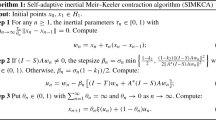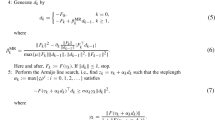Abstract
This article proposes a strong convergence CQ relaxed iterative method with alternated inertial extrapolation step in a real Hilbert space. The propose method converges strongly under some suitable and easy to verify assumptions. Moreover, the proposed method does not require the prior knowledge of the operator norm or estimate of the matrix norm. Instead, the stepsize is self-adaptive with a simple selection procedure that does not involve any linesearch procedure. Numerical experiments to illustrate the computational performance together with implementation of the proposed method in signal recovery application is presented. Additionally, comparison of the method with some existing iterative methods in the literature is performed.







Similar content being viewed by others
References
Anh PK, Vu TD (2018) A new self-adaptive CQ algorithm with an application to the lasso problem. J Fixed Point Theory Appl 20(4):142
Bauschke HH, Combettes PL (2011) Convex analysis and monotone operator theory in Hilbert spaces, vol 408. Springer, Berlin
Beck A, Teboulle M (2009) A fast iterative shrinkage-thresholding algorithm for linear inverse problems. SIAM J Imaging Sci 2(1):183–202
Byrne C (2002) Iterative oblique projection onto convex sets and the split feasibility problem. Inverse Probl 18(2):441
Byrne C (2003) A unified treatment of some iterative algorithms in signal processing and image reconstruction. Inverse Probl 20(1):103
Byrne C, Censor Y, Gibali A, Reich S (2012) The split common null point problem. J Nonlinear Convex Anal 13:759–775
Censor Y, Elfving T (1994) A multiprojection algorithm using Bregman projections in a product space. Numer Algorithm 8(2):221–239
Censor Y, Elfving T, Kopf N, Bortfeld T (2005) The multiple-sets split feasibility problem and its applications for inverse problems. Inverse Probl 21(6):2071
Censor Y, Bortfeld T, Martin B, Trofimov A (2006) A unified approach for inversion problems in intensity-modulated radiation therapy. Phys Med Biol 51(10):2353
Cholamjiak P, Suantai S et al (2019) A new CQ algorithm for solving split feasibility problems in Hilbert spaces. Bull Malays Math Sci Soc 42(5):2517–2534
Dang Y, Sun J, Honglei X (2017) Inertial accelerated algorithms for solving a split feasibility problem. J Ind Manag Optim 13(3):1383–1394
Gibali A, Dang TM (2019) A new relaxed CQ algorithm for solving split feasibility problems in Hilbert spaces and its applications. J Ind Manag Optim 15(2):963
Gibali A, Duong VT (2020) Three new iterative methods for solving inclusion problems and related problems. Comput Appl Math 39(3):1–23
Gibali A, Liu L-W, Tang Y-C (2018) Note on the modified relaxation CQ algorithm for the split feasibility problem. Optim Lett 12(4):817–830
He S, Zhao Z (2013) Strong convergence of a relaxed CQ algorithm for the split feasibility problem. J Inequal Appl 1:197
Kesornprom S, Pholasa N, Cholamjiak P (2019) On the convergence analysis of the gradient-CQ algorithms for the split feasibility problem. Numer Algorithm 20:1–21
López G, Martín-Márquez V, Wang F, Hong-Kun X (2012) Solving the split feasibility problem without prior knowledge of matrix norms. Inverse Probl 28(8):085004
Lorenz DA, Pock T (2015) An inertial forward–backward algorithm for monotone inclusions. J Math Imaging Vis 51(2):311–325
Maingé P-E (2007) Approximation methods for common fixed points of nonexpansive mappings in Hilbert spaces. J Math Anal Appl 325(1):469–479
Maingé P-E (2008) Strong convergence of projected subgradient methods for nonsmooth and nonstrictly convex minimization. Set-Valued Anal 16(7–8):899–912
Malitsky Y, Pock T (2018) A first-order primal-dual algorithm with linesearch. SIAM J Optim 28(1):411–432
Moudafi A, Gibali A (2018) l 1-l 2 regularization of split feasibility problems. Numer Algorithms 78(3):739–757
Mu Z, Yang P (2015) A note on the inertial proximal point method. Stat Optim Inf Comput 3(3):241–248
Nesterov Y (1983) A method for unconstrained convex minimization problem with the rate of convergence o (\(1/k^{2}\)). Doklady USSR 269:543–547
Nguyen TLN, Shin Y (2013) Deterministic sensing matrices in compressive sensing: a survey. Sci World J 20:20
Osilike MO, Isiogugu FO (2011) Weak and strong convergence theorems for nonspreading-type mappings in Hilbert spaces. Nonlinear Anal Theory Methods Appl 74(5):1814–1822
Polyak BT (1964) Some methods of speeding up the convergence of iteration methods. USSR Comput Math Math Phys 4(5):1–17
Sahu DR, Cho YJ, Dong QL, Li KMR, XH, (2020) Inertial relaxed CQ algorithms for solving a split feasibility problem in Hilbert spaces. Numer Algorithms 20:1–21
Sahu DR, Yao JC, Verma M, Shukla KK (2020) Convergence rate analysis of proximal gradient methods with applications to composite minimization problems. Optimization 20:1–26
Shehu Y, Gibali A (2020) New inertial relaxed method for solving split feasibilities. Optim Lett 20:20
Shehu Y, Iyiola Olaniyi S (2017) Convergence analysis for the proximal split feasibility problem using an inertial extrapolation term method. J Fixed Point Theory Appl 19(4):2483–2510
Shehu Y, Vuong PT, Cholamjiak P (2019) A self-adaptive projection method with an inertial technique for split feasibility problems in banach spaces with applications to image restoration problems. J Fixed Point Theory Appl 21(2):50
Suantai S, Shehu Y, Cholamjiak P, Iyiola Olaniyi S (2018) Strong convergence of a self-adaptive method for the split feasibility problem in Banach spaces. J Fixed Point Theory Appl 20(2):1–21
Suantai S, Pholasa N, Cholamjiak P (2019) Relaxed CQ algorithms involving the inertial technique for multiple-sets split feasibility problems. Rev Real Acad Cie Exactas Fís Nat Ser A Mat 113(2):1081–1099
Tibshirani R (1996) Regression shrinkage and selection via the lasso. J R Stat Soc Ser B (Methodol) 58(1):267–288
Wang F, Yu H (2020) An inertial relaxed CQ algorithm with an application to the lasso and elastic net. Optimization 20:1–19
Acknowledgements
The authors acknowledge the financial support provided by the Center of Excellence in Theoretical and Computational Science (TaCS-CoE), KMUTT. The first, third and fourth authors were supported by Petchra Pra Jom Klao Ph.D. Research Scholarship from King Mongkut’s University of Technology Thonburi, Thailand (Grant nos. 38/2018, 37/2018 and 16/2018, respectively). Moreover, this research was funded by King Mongkut’s University of Technology North Bangkok, Contract no. KMUTNB-65-KNOW-28.
Author information
Authors and Affiliations
Corresponding author
Additional information
Communicated by Antonio José Silva Neto.
Publisher's Note
Springer Nature remains neutral with regard to jurisdictional claims in published maps and institutional affiliations.
This project was supported by Petchra Pra Jom Klao Doctoral Academic Scholarship for Ph.D. Program at KMUTT. Moreover, this research was funded by Thailand Science Research and Innovation Fund, and King Mongkut’s University of Technology North Bangkok with Contract no. KMUTNB-BasicR-64-22.
Rights and permissions
About this article
Cite this article
Abubakar, J., Kumam, P., Taddele, G.H. et al. Strong convergence of alternated inertial CQ relaxed method with application in signal recovery. Comp. Appl. Math. 40, 310 (2021). https://doi.org/10.1007/s40314-021-01567-7
Received:
Revised:
Accepted:
Published:
DOI: https://doi.org/10.1007/s40314-021-01567-7
Keywords
- Split feasibility problem
- Strong convergence
- Half-space
- Inertial technique
- Inverse problem
- Compressed sensing




